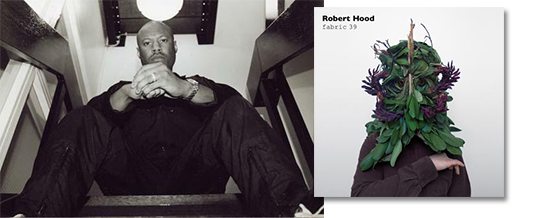Q & A: Robert Hood
Carleton S. Gholz recently spoke with Robert Hood, the longtime techno DJ and producer who […]

Q & A: Robert Hood
Carleton S. Gholz recently spoke with Robert Hood, the longtime techno DJ and producer who […]

Carleton S. Gholz recently spoke with Robert Hood, the longtime techno DJ and producer who is also known as the founding member of legendary Detroit collective Underground Resistance. Hood currently resides in Alabama, where he recently took time to answer questions about playing in Europe, the future of Detroit, and his latest release for Fabric.
XLR8R: We are talking today because of your recent mix for the Fabric nightclub and record label in London. Why is Fabric such an important place for dance music?
Robert Hood: A lot of places I’ve played were clubs with techno themes or techno nights. In my opinion, Fabric is a techno discotheque. Fabric gives techno artists a forum to come in and focus on the dancer, and not entirely on the DJ’s performance.
Could you imagine a situation where you might have had a musical career that lasted this long without Europe?
As far as my career in music, it is hard to consider a future without Europe’s support. Before my career even began, artists like Thomas Dolby, Heaven 17, and Kraftwerk had a profound influence on my musical direction. Then, as my musical career took me to the U.K. and Europe, I paid attention to how the kids across the water moved to this music. It made me focus on how to get inside of their minds. I noticed that Detroit and Berlin were bouncing ideas back and forth. It was no longer enough to want Detroit to feel my sound. I needed the entire planet to feel me.
Your Fabric mix travels throughout Europe in terms of the artists and labels that you use. Can you talk a little about your current relationships with the Music Man label in Belgium and Logistic in France? What is the current status of your M-Plant label? Is it a good time to make records compared to other times in your career?
The Music Man situation is stable as another means of putting out music–we’re still getting it done, you know what I mean? As far as Logistic goes, I still play with John Thomas, but I’m no longer working with the label at present. The M-Plant catalog [will] soon be available in digital form, and later in physical form sometime this year. I think this is an experimental time for distribution right now. We’re all taking advantage of innovations in alternative distribution.
You have mentioned wanting to tell stories with your music and that with each of your projects you “like to read like a book.” Can you talk about a favorite book and how it might help you think through your own music?
My favorite book is The Principles and Power of Vision by Dr. Myles Munroe, which is more of a self-help/inspirational book than a book with a storyline. It’s helped me and inspired me to re-focus on my God-given gift and uniqueness.
You were clearly influenced by hip-hop in the late 1980s and early 1990s, as evidenced by early tracks like “Dance to the Beat.” At the time, did you think that techno and hip-hop were connected?
In those days techno, hip-hop, and house wasn’t as segregated as they are today. I remember going to clubs where you could hear a mixture of all these sounds. I still listen to hip-hop but not rap; DJ Muggs vs. GZA/The Genius’ album Grandmasters (Angeles 2005) has been a major influence on my music. My first thoughts on minimalism came from Run DMC’s “It’s Like That,” because it was so stark and stripped down.
It is the 20th anniversary this year of Techno: The New Dance Sound of Detroit (Virgin 10 Records). In the liner notes to the album, the writer, Stuart Cosgrove, starts by saying, “Think of Detroit and you automatically think of Motown. But be careful not to think too loud because the new grandmasters of Detroit techno hate history.” Cosgrove goes on to argue that techno was anti-Motown, a pure break with the past musical and cultural history of Detroit. Looking back on it, do you think that was true?
How can you know where you’re going if you don’t know where you’ve been? Techno is supposed to be future music but you can’t forget your musical roots, your history. If you do, you’ll end up lost, with no sense of direction. Berry Gordy first made it possible for young black men to own and operate a successful record label–a label that created timeless music. You can’t forget the innovations that Stevie Wonder, Marvin Gaye, and the Motown engineers made in recording. Without James Brown and others, I truly believe there wouldn’t be techno. We shouldn’t dwell on the past but we should never forget because it makes you appreciate who you are today.
You have talked about “thinking of Detroit like a museum” in the sense of its demise as an industrial powerhouse, its abandoned buildings, gray sky, etc. Can you imagine ever living in Detroit again?
Detroit is turning into the vibrant city it once was cosmetically. But the inner workings of the city’s administration are in question. I can’t say if I would ever go back. I’m content where I am, with my family, believe it or not. It’s a content place.

